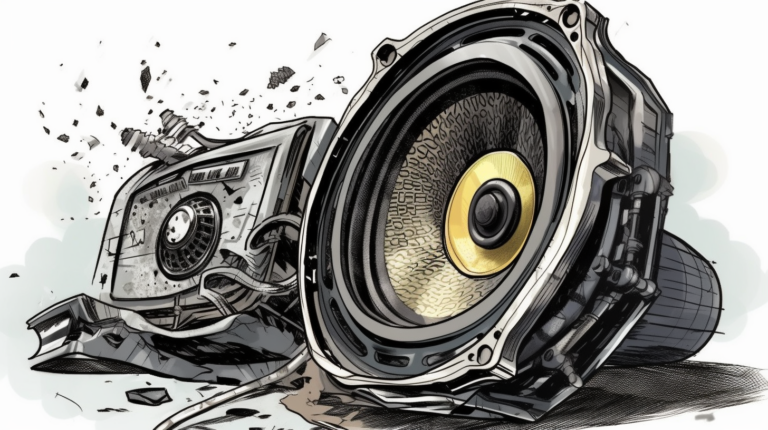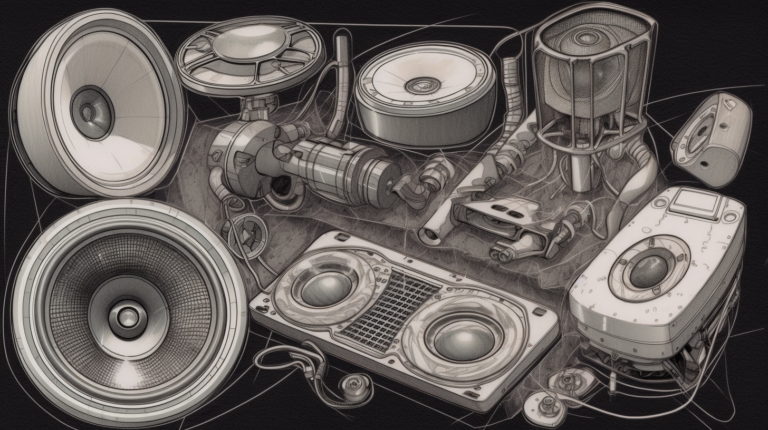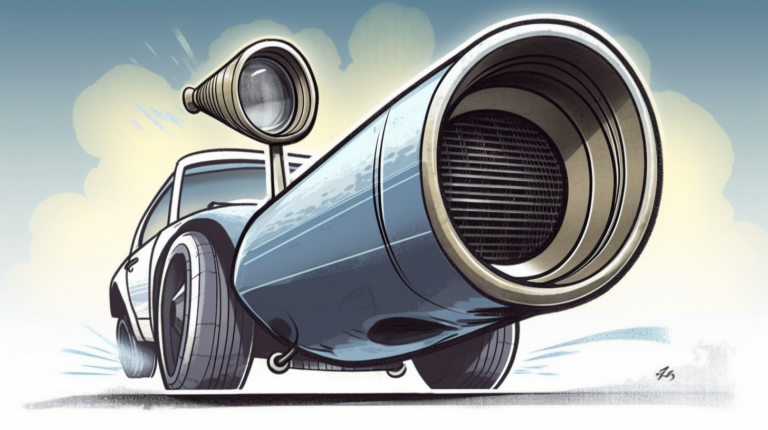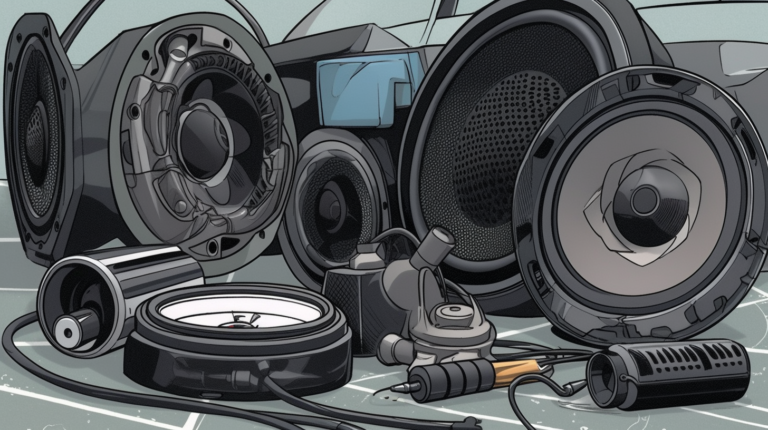Have you ever wanted to add some thumping bass to your leased car ride? You’re not alone. Many people want a little extra sound, but they don’t want to risk violating their lease agreement and having steep penalties. The good news is that it can be done safely with the right precautions.
In this article, we will discuss the various steps involved in putting subwoofers into a leased car without breaking any of the rules outlined in the contract. We’ll also provide tips on how to maximize safety while doing so. By the end of this article, you should have all the information needed to make an informed decision about whether or not adding subwoofers is right for you and your vehicle.
So if you’re looking for ways to boost your audio system’s performance without running afoul of your lease agreement, read on! We’ll help you get clearer answers regarding what risks are associated with installing subwoofers in a leased car and how best to protect yourself from them.
Checking With Leasing Company
Before making any decisions, it’s important to check with your leasing company on their policies and regulations regarding subwoofers. Many lease agreements have stipulations about what modifications can be made to the car during its term. Failing to abide by these terms could result in fines or other damaging consequences. Be sure to look over the agreement carefully and make note of anything that may conflict with your plans before taking action. By doing this research ahead of time, you can avoid future issues down the road and make an informed decision when deciding whether or not to install a subwoofer in your leased vehicle.
However, if a lease agreement does allow for some temporary modification leeway, it likely only refers to parts that can be easily removed. A custom paint job or aftermarket speaker components that require cutting into the car’s wiring harness are almost certainly a no-go on a leased vehicle.
Some cars are pre-wired for navigation systems, premium sound systems, and even back up cameras, and while they don’t come equipped with those systems, they can easily be installed. However, by the end of the lease, those additions need to be removed, and the original systems replaced at the driver’s expense.
It is therefore important to consider whether it is worth it to add subwoofers to a leased car or to wait until you own a car to make such modifications.
Regulations On Modifications
Modifying a leased car can be complicated, as there are certain regulations that must be followed. It’s important to read your lease agreement carefully and become familiar with the rules concerning modifications before making any changes to the vehicle. The type of modification you’re planning may or may not be allowed under the terms of your contract. Car modification laws vary by state and jurisdiction, so it’s best to contact an attorney or other legal expert in order to know what is permissible for your situation.
Lease modification restrictions usually include items such as tinted windows, fog lights, exhaust systems, grills, spoilers, rims and tires. You should also take into account any additional costs associated with modifying your car; some leases will require payment for labor and/or parts if these were used in the installation process. Additionally, most contracts specify that any alterations made to the vehicle must meet local standards for safety requirements – this includes being properly installed according to manufacturer guidelines. Finally, it’s always important to remember that all modifications done on a leased car remain property of the lessor until it reaches its end date or is paid off in full.
Customizing Speakers
Customizing the speakers in your leased car is a great way to get the sound system of your dreams. After all, who doesn’t want premium audio components that enhance their listening experience? Fortunately, there are many options for speaker upgrades that shouldn’t break the bank or void your lease agreement.
One popular choice for enhancing the sound quality of an existing car stereo is adding subwoofers. Subwoofers can provide deeper bass and more clarity to any song you play on your sound system, making it much easier to appreciate all its nuances. Plus, these speakers come in different sizes and shapes so you can find one that fits perfectly into your vehicle’s interior design scheme.
Upgrading your car speakers not only brings out the best in every track but also adds a touch of personalization to it as well. So don’t be afraid to invest in some higher-end audio components – they will give you years of enjoyment without ever having to worry about breaking your lease terms!
Legal Implications Of Changes
Making changes to a leased car can be tricky, especially when it comes to subwoofers. Before making any alterations to the car, it is important to consider legal implications and modification laws. Lease agreements usually include specific restrictions on what type of modifications are allowed in a leased vehicle. It is generally advised that drivers consult their lease agreement before attempting any major changes or installations.
Failure to abide by modification laws may cause an individual’s liability for damages incurred as a result of the change. Additionally, if modifications violate the terms of the lease agreement, there could be consequences such as early termination of the contract or additional fees imposed by the leasing company. Therefore, taking time to familiarize oneself with local regulations and consulting one’s lease agreement can help prevent costly mistakes down the road while also ensuring peace-of-mind and safety.
Extended Warranties And Service Contracts
When leasing a car, you may be considering an extended warranty or service contract. These contracts can provide additional coverage and help protect against potential repair costs. Extended warranties typically cover parts that break down after the manufacturer’s standard warranty has expired. Service contracts often include more comprehensive coverage than extended warranties, such as oil changes and tire rotations.
However, before signing up for either of these plans it is important to research them carefully. Read through all the fine print in order to understand what exactly is covered and for how long. Many companies offer different tiers of protection with varying prices; so make sure to compare options from several providers before making your decision. Be aware that some dealerships mark-up the price at which they sell these agreements – do not let yourself get taken advantage of! Ultimately, if you decide to invest in an extended warranty or service contract, you should feel confident that it will suit your needs and save money on repairs over time.
Cars With Factory Warrany
When it comes to leased vehicles, many people wonder if they can modify their car without violating the factory warranty. It’s important to understand that any modifications made to a leased vehicle may void its factory guarantee. This means that if you install subwoofers or other sound systems in your rented car, you risk losing out on the benefits of having a vehicle-guarantee.
It’s not just audio equipment either; adding auxiliary parts and performance enhancements could also invalidate your warranty coverage. Furthermore, some lease agreements forbid modifying cars at all, so be sure to check with your leasing company before making any changes to ensure that you won’t run afoul of the terms of your agreement.
The bottom line is that while adding subwoofers could improve the look and feel of your ride, it isn’t worth jeopardizing the protection afforded by your vehicle-warranty – especially when renting a car!
Lease Agreement Restrictions
When it comes to leasing a car, lease agreement limits often apply. This means that modifying the vehicle during the course of its lease duration may not be allowed. For example, if you’re thinking about installing subwoofers in your leased car, check with your dealership or leasing company first. They can let you know what modifications are accepted and which ones aren’t allowed under your lease agreement restrictions.
In some cases, certain modifications may void the terms of your lease contract or even lead to early termination. If there is an issue with making changes to the vehicle while it is still being leased, then speak with the dealership or leasing company before attempting any modifications. Lease modification restrictions vary from one agreement to another and could result in fees for breaking them. So make sure you understand all of the rules surrounding any potential changes you’re considering making before taking action.
Temporary Modification Leeway
When it comes to car leases, most people are curious about the extent of modification leeway they have. Can you put subwoofers in a leased car? The answer is yes, but with some caveats. Here’s what you need to know:
- You should always consult your lease agreement first before making any modifications.
- Temporary modifications are generally allowed under normal circumstances and can easily be reversed if needed.
- Any permanent changes may require written permission from your lessor or leasing company depending on the terms of your contract.
- If you decide to make major changes, then consider returning the vehicle at the end of the lease term rather than buying it out since the value will likely decrease significantly as a result of these tweaks .
Overall, when considering whether or not to add subwoofers (or any other type of modification) into a leased car, always pay attention to how long-term those changes might be for safety reasons and read through all paperwork carefully before doing so!
Aftermarket Speaker Components
Moving on from Temporary Modification Leeway, it is possible to install aftermarket speaker components in a leased car. Such components can be amplifier components, amp wiring kits and speaker enclosures. Depending on the type of leased car you have, some modifications may require permission from your leasing company.
It is best practice to consult your lease agreement before making any changes or upgrades as this will provide an understanding of what kind of modifications are allowed and prohibited when it comes to your specific vehicle. Additionally, if you do decide to add new speakers, amplifiers or other audio components, make sure that all connections are properly secured and that the electrical system meets safety standards. As with any modification made to a vehicle, it’s important to consider the potential impacts such changes could have on both your safety and the value of the car itself.
Navigation Systems And Backup Cameras
Navigation systems and backup cameras are becoming increasingly popular in today’s vehicles. Not only do they provide convenience and a sense of security, but they also add value to your car without needing any modifications or installations. Navigation systems allow you to easily find your destination with the help of GPS mapping technology, while backup cameras make it easier for drivers to back up safely by giving them an enhanced view of what is behind their vehicle.
Premium navigation systems come equipped with features such as lane guidance, traffic alerts, voice recognition, and real-time traffic information, making them even more useful. Backup cameras often come integrated into rearview mirrors or dashboards, allowing drivers to have a better field of vision when backing up. They can be connected directly to the car’s audio system so that reversing instructions from the camera are heard through the speakers.
These features are great additions for both leased cars and those owned outright. With these technologies installed in your vehicle you can feel safer on the road knowing that there is less chance of experiencing an accident due to poor visibility or incorrect directions. The added bonus of not having to modify anything makes installing navigation systems and backup cameras easy—and well worth it!
Considerations For Adding Subwoofers
When upgrading a car’s audio system, one of the most popular modifications is adding subwoofers. This can be tricky if you’re leasing your vehicle, as many leases don’t allow for sound system modifications or additions. It’s important to know what’s allowed before attempting any audio upgrades in order to avoid penalties when returning the leased vehicle.
First and foremost, consult your lease agreement – it should state what types of modifications are prohibited or acceptable. If you’re unsure about whether subwoofers are included in those parameters, contact your leasing company directly to find out what their specific guidelines are regarding sound system modifications. You may also need to inform them that you plan on making these changes ahead of time so they can make an official note of it in case there’s ever an issue with damages when the car gets returned.
It’s important to bear in mind that some dealerships may refuse to accept any modified vehicles back from leaseholders, even if everything was done according to their stipulations; this could leave you stuck paying extra fees or being unable to return the car at all without settling the full loan balance first. With that said, taking into account all potential issues and ensuring that you’ve taken every step necessary will help protect yourself against costly surprises down the line.
Benefits Of Waiting Until Owning A Car
Waiting to install subwoofers until you own your car has its advantages. First, cost savings is a major benefit; instead of having to pay hefty installation fees for leased vehicles, you can invest in the quality materials needed to get the sound quality that you desire without breaking the bank. Additionally, with a permanent installation, you will not have to worry about taking out and reinstalling your equipment if you ever decide to move or upgrade vehicles.
Moreover, with an owned vehicle, it’s easier than ever to customize the audio system according to your needs. You can choose from different sizes and types of subwoofers as well as high-grade amplifiers depending on how much bass output and power you need. This way, you are sure to get crystal clear sound delivered at optimal levels – something that cannot be achieved when installing subwoofers in a leased car.
The bottom line: When investing in your dream set up for music listening pleasure, waiting till you own your car allows more flexibility so that you reap maximum benefits for cost savings and sound quality but also enjoy a permanent installation tailored specifically for your taste!
Cutting Into Wiring Harness
It’s possible to install subwoofers in a leased car, but it requires cutting into the wiring harness. This means that you’ll have to splice wires together and make other electrical repairs. It can be dangerous work as cars are designed with complex electrical systems that need to be handled carefully. Therefore, before attempting this type of job yourself, it is highly recommended that you seek help from a professional installer or mechanic who understands the intricate details of automotive wiring.
An experienced technician will know how to properly cut into the harness without causing damage or creating safety hazards. They also understand how to use proper tools for safely making splices and completing other necessary electrical repair tasks. Additionally, they should always test any new modifications thoroughly after installation before allowing anyone back inside the car. Taking these extra steps ensures that your vehicle remains safe and compliant with local regulations for leased vehicles.
Which is a Better Option for Car Sound Enhancement: Subwoofers or Soundbars?
When it comes to enhancing the sound quality in your car, the choice between car subwoofers or soundbars can be tough. Both options have their own merits. Subwoofers deliver powerful bass and rumbling vibrations, perfect for audiophiles seeking immersive music experiences. On the other hand, soundbars offer a sleek and compact design, making them a convenient solution for minimalists. Ultimately, the decision depends on your personal preferences and the desired audio output for your car.
Installing Premium Sound Systems
Installing a premium sound system in your leased car can be an exciting prospect, but there are several important factors to consider before committing. You’ll need to determine whether the cost of installation and upgrades will fit within your budget or if you have enough technical know-how to make it happen yourself.
Here’s a list of things to keep in mind when considering how to install a premium sound system in your leased vehicle:
- Determine which components of the sound system you want to upgrade first – such as amplifiers, subwoofers, speakers etc.
- Consider what kind of power output is available for your particular model of car, so that you don’t overtax its electrical system with too much wattage.
- Research all necessary parts and accessories needed for installation and ensure they’re compatible with each other.
- Reach out to professionals who specialize in sound system installations and upgrades for further advice on getting the most from your investment.
By taking into account these key points when planning a premium sound system installation, you should be able to enjoy quality audio without compromising safety or exceeding the limits of your lease agreement.
Removing Additions At The End Of The Lease
Leasing a car is an attractive option for many people, but it comes with certain responsibilities. When you lease a car, you are obligated to return the vehicle in similar condition as when it was leased from the dealership. This means that any aftermarket components or additions made to the car must be removed prior to returning the vehicle at the end of its term.
This includes subwoofers and other audio equipment installed in a leased car. It’s important to remove these items before handing back your keys, otherwise there could be additional charges levied by the leasing company. Depending on what kind of modifications have been done to the vehicle, complete removal may not always be possible – so make sure you consult with a professional who can help ensure all changes are appropriately reversed before attempting to return your leased car.
Conclusion
In conclusion, when it comes to installing subwoofers in a leased car, there are several things to consider. It’s important to check with the leasing company first to ensure you’re following their regulations and won’t be penalized for making modifications. You should also take into account any legal implications that come along with changes made on a leased vehicle. Despite all of this, if you choose to customize your speakers while leasing a car, there can still be advantages like enjoying premium sound systems or improved audio quality. Just make sure you know what needs to be done at the end of the lease in order to remove any additions that have been made so as not to face extra charges. All in all, most people would recommend waiting until owning a car before taking on such an endeavor but if you feel confident about doing so now – go ahead!





















Wow, superb blog structure! How lengthy have you ever been running a blog
for? you make running a blog look easy. The whole look of your web site is excellent, as
neatly as the content material! You can see similar here sklep online
I like this web site very much, Its a real nice post to read and get
info.Blog money